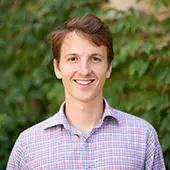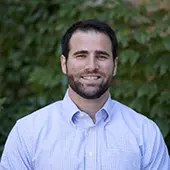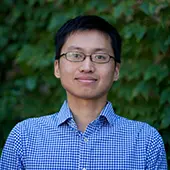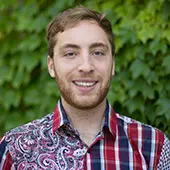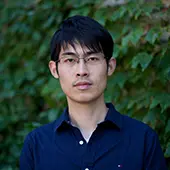2016-2017 Cluster Fellows
Quentin Sherman
Department/Program: Materials Science and Engineering
Faculty Advisors: Peter Voorhees, Frank C. Engelhart Professor of Materials Science and Engineering and (by courtesy) Professor of Engineering Sciences and Applied Mathematics; Co-Director, CHiMaD
Status of Studies: Graduated with PHD in Materials Science in 2017
What is your area of focus at Northwestern?
Corrosion accounts for hundreds of billions of dollars in annual losses in the United States, or a few percent of the GDP. To help address this, I develop computational models to predict how metals and alloys will corrode in various environmental conditions. This will help transition development of novel corrosion resistant materials from experimental to computational processes, which are faster and more efficient.
Brief personal history:
I grew up in Austin, TX and attended Haverford College for undergrad, where I majored in physics. After graduating in 2012 I came straight to Northwestern to pursue a PhD in Materials Science. During my first two years in the program I researched catalytic nanoparticles in solid oxide fuel cells, then transitioned to my current project on corrosion. Outside of my research I am involved in a few energy and sustainability student groups, and am invested in further developing that community on campus. This year I will also be serving as a Fellow for Allied Minds, a publicly traded early-stage venture firm based in Boston, and gain first-hand experience in technology marketization.
Why were you interested in becoming a Cluster Fellow?
I sought the Cluster Fellowship in order build stronger cross-disciplinary relationships on campus and contribute to the Institute's mission of energy and sustainability development within the Northwestern community. I am also interested in furthering my education through coursework at the Institute. I hope that my PhD training, work as a Fellow, and the private-sector experience I gain through Allied Minds this year will adequately prepare me to make a meaningful impact in sustainable development in the global community after graduating.
My future plans include:
I joined Bain & Company as a management consultant in New York. Projects I worked on include utility, healthcare and private equity industries. Renewable energy and sustainability remain topics I care deeply about, and hope to connect more closely to my career in the future.
Phillip Goodman
Department/Program: Business Administration / Law
Faculty Advisor: David Besanko, IBM Professor of Regulation & Competitive PracticesStatus of Studies: Third year JD/MBA candidate
What is your area of focus at Northwestern?
I am pursuing a JD/MBA focusing on finance and infrastructure. Through studying legal structures and advanced finance topics, I hope to develop a skillset that helps me develop innovative methods to get renewable energy projects off the ground.
Brief personal history:
Born and raised in Southern California, I went to Georgetown University in Washington DC to study international politics. After a brief foray into politics, I joined a boutique strategy consulting firm called Avascent that focused on developing growth strategies for companies in government-driven markets, most commonly aerospace and defense. That consulting experience piquedmy interest in infrastructure writ large, driving me to get my JD/MBA at Northwestern as I shift my industry focus and primary job function. Most recently, I interned at SunPower (NASDAQ: SPWR) on the global project finance team for utility-scale projects.
Why were you interested in becoming a Cluster Fellow?
As a studentwho already straddles two schools and communities, I wanted to become a Cluster Fellow to further engage with students interested in sustainability issues and come from different backgrounds. I am excited to learn from other Fellows, faculty and guests, as well as to contribute my experiences to the group.
Ding-Wen Chung
Department/Program: Materials Science and Engineering
Faculty Advisor: David Dunand, Professor of Materials Science and Engineering; David Seidman, Walter P. Murphy Professor Emeritus of Materials Science and Engineering; Founding Director of the Northwestern University Center for Atom-Probe Tomography (NUCAPT)Status of Studies: Second Year
What is your area of focus at Northwestern?
My research focuses on improving the operational temperature and corrosion resistance of cobalt based superalloy turbine blade materials. The use of turbine blades is ubiquitous in modern society ranging from jet engine to power plant. By improving its operational temperature and corrosion resistance, we are able to generate energy more efficiently. Specifically, I am working on design of multinary alloy system containing up to 10 alloying elements for performance optimization.
Brief personal history:
I was born in Taiwan but spent a few years in Thailand before coming to U.S. for undergraduate study. I obtained my BS and MS degree from Purdue University during which I was also a visiting student in Oak Ridge National Laboratory and UCLA. Throughout my study, I was exposed to a variety of energy technology research including lithium ion batteries, thermoelectrics and organic solar cells.
Why were you interested in becoming a Cluster Fellow?
The Institute is one the most diverse energy research program in the university. I believe that as a Cluster Fellow, I will be able to further expand my knowledge on various energy technology and understand the current energy landscape in the world. Also, through interaction with students and faculties from other disciplines, we have the opportunity to understand and tackle challenges in sustainable energy collaboratively.
Alex Grant
Department/Program: Chemical and Biological Engineering
Faculty Advisor: Justin Notestein, Chair and Professor of Chemical and Biological EngineeringStatus of Studies: Second Year
What is your area of focus at Northwestern?
My research focuses on the discovery of new catalysts for methanol synthesis from carbon dioxide. This reaction is very interesting because finding a market to sell "upcycled" carbon dioxide (as methanol, for example) is important for economically motivating industry to not emit their CO2 into the atmosphere. I am using the Notestein Research Group's knowledge of nanostructured catalysts (particularly copper) to design these new catalysts. Further, I am building the SOFI demo unit for the Solar Fuels Institute here at Northwestern, which will demonstrate the conversion of atmospheric CO2 to methanol, and show off Northwestern's strong solar fuels research program!
Brief personal history:
I was raised in Toronto, Ontario, and attended McGill University in Montreal. I worked at a startup in Montreal called Terragon Environmental Technologies as an analytical chemist's assistant and rookie process engineer. I completed a research internship at the EPFL in Lausanne, Switzerland in 2014 with Prof. Heinrich Hoffmann where I worked on magnetic separations for iron oxide nanoparticles for cancer hyperthermia treatment. In 2015, I worked at the UNAM in Mexico City with Prof. Carmen Duran Dominguez, where I tested photocatalysts for dye degradation. I earned my B.Eng in Chemical Engineering from McGill in 2015, and starting working with Justin Notestein at Northwestern in late 2015.
Why were you interested in becoming a Cluster Fellow?
Energy is the most important human tool ever. Capturing, storing, moving, and releasing it is part of every story of human enterprise, and the last century has made this story much more obvious and important. We once had to capture energy from nature at its convenience but engineers and entrepreneurs figured out which products from the ground (coal, oil) could be used to obtain energy easily and when we need it. We now know that this easy energy has a very dangerous side-effect: climate change. I am working to help end our reliance on fossil fuels to mitigate climate change, or at least to prevent the side-effects of their use. The Institute is an amazing community of researchers, students, and industry partners for solving the same goal. This is why I wanted to be part of this community!
This experience has enriched my time here at Northwestern by:
I published one paper related to CO2 hydrogenation work, titled “Role of surface reconstruction on Cu/TiO2 nanotubes for CO2 conversion” in Applied Catalysis B: Environmental, Volume 255, 15 October 2019, 117754 with Chao Liu, Scott L.Nauert, Marco A. Alsina, Dingdi Wang, Alexander Grant, Kai He, Eric Weitz, Michael Nolan, Kimberly A.Gray, Justin M. Notestein. I also co-started Lilac Solutions. I am currently an independent advisor consulting on multiple lithium mining projects around the world.
Lingqiao Li
Department/Program: Chemical and Biological Engineering
Faculty Advisor: John M. Torkelson,
Walter P. Murphy Professor of Chemical and Biological Engineering and Materials Science and EngineeringStatus of Studies: Second Year
What is your area of focus at Northwestern?
My research focuses on synthetic concept and method for overcoming the challenge associated with the unsustainability of conventional polymer network materials (e.g. tires), which cannot be recycled into high-value products because of permanent, covalent cross-links. I have developed a novel synthetic strategy that allows for producing recyclable polymer networks based on dynamic cross-links. I am further trying to adapt this strategy to providing control over the structure of polymer network materials, which can be very helpful for energy related applications.
Brief personal history:
I grew up in Anqing, a small city in central China. In 2010, I attended Tianjin University for my undergrad, where I majored in chemical engineering. During my undergrad, I worked on different research projects including vapor-liquid equilibria, nano-composites, and proton exchange membranes. In 2014, I came to Northwestern, where I joined Torkelson lab working on polymeric materials.
Why were you interested in becoming a Cluster Fellow?
Energy and material sustainability is crucial to the advancement of human society, which is a challenge that cannot be overcame by any individual discipline. The Institute is a community providing great opportunities for inter-discipline collaboration, which enables mutually reinforcing in between fellows. Additionally, the program allows for comprehensive education on energy and material sustainability, which maintains fellows in a better shape when facing sustainability challenges.
